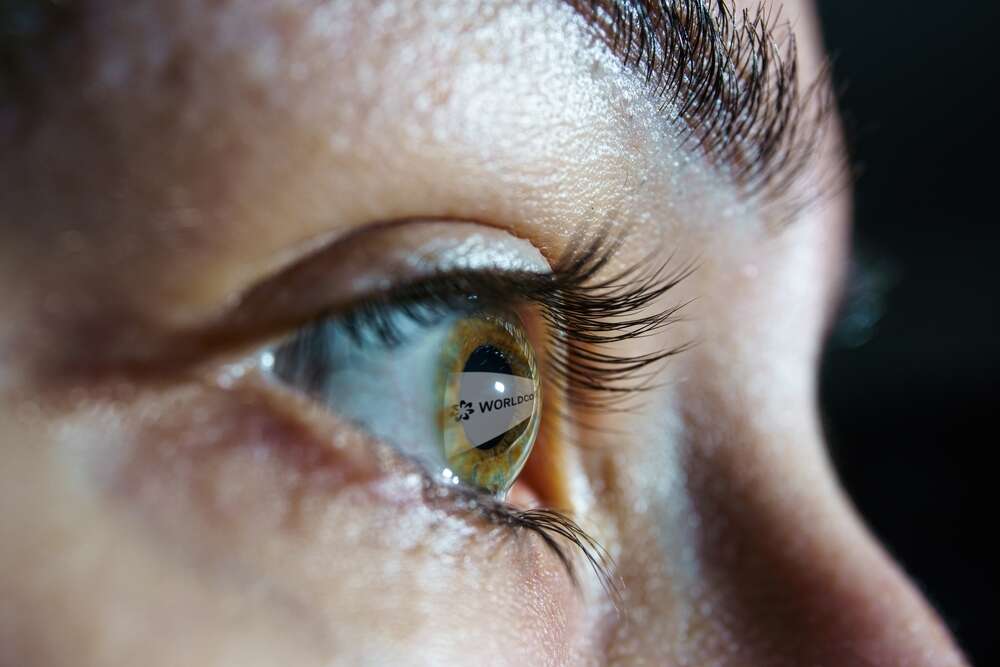At the end of July, Alfie Denwood headed down the road from his office in Moorgate, London, to spend a few minutes getting his eyeballs scanned by a shiny, bowling-ball-sized silver ‘orb’ — the flagship technology behind OpenAI CEO Sam Altman’s new cryptocurrency project, Worldcoin. Denwood expected an extrasensory extravaganza, but what he got was a bit of a letdown. “You don’t really feel anything,” he says, a little disappointedly. “You don’t see the lasers coming at your eye or anything like that.”
In exchange for submitting his eyeballs to the scrutiny of a mysterious orb on his lunch hour, Worldcoin provided Denwood with a ‘World ID,’ a unique biometric passport intended to be an anchor for identification amid all the swirling uncertainty created by generative AI. Did that come with any privacy concerns for the consultant at GCS Financial Services? Apparently not. Despite polite questions from his colleagues in the office, Denwood was satisfied by Worldcoin’s commitment to privacy and safety on its website. “I’m happy to give my details to Apple […] for FaceID,” he says. “I didn’t see too much of an issue with it.”
Worldcoin formally launched in over 20 countries in late July. In cities from Tokyo to Bangalore, London to Nairobi, long queues quickly formed of people ready and eager to have their irises scanned by the project’s signature orbs. Not everyone’s enthusiasm about the project was idealistic. In select jurisdictions, Worldcoin promised new sign-ups a small payment in the form of its own cryptocurrency, WLD, which at the time of writing, is currently trading at $1.94.
Worldcoins’ creators hail their project as an innovative solution to one of the central problems arising from the rapid rise of Generative AI: providing proof of individual personhood in a digital landscape rife with bots and scammers. The Worldcoin Foundation has a pretty bold ambition, too, aiming to ‘establish universal access to the global economy regardless of country or background.’ Sam Altman is particularly fond of talking about how Worldcoin could facilitate the future deployment of Universal Basic Income (UBI) in a post-AI landscape. “People will be supercharged by AI,” he told Reuters rather optimistically, a development “which will have massive economic implications.”
According to Worldcoin’s CEO Alex Blania, more than two million people have already signed up to have their eyeballs scanned during the startup’s two-year trial period. The firm’s success in enlisting so many users so quickly has unnerved some stakeholders. On August 2nd, Kenya became the first country to officially suspend Worldcoin’s activities and launch an investigation into the project, while data watchdogs in the UK, France and Germany have announced their active interest in its biometric adventures. One objector in San Francisco resorted to expressing their concerns in vibrant orange spray paint across a Worldcoin recruitment poster. “Orwell was right,” read the message, overlaid over a minimalist depiction of the startup’s iris-scanning machine in all its grey glory. “Smash the orbs.”

Worldcoin 101
Worldcoin isn’t new. Founded in 2019 by OpenAI CEO Sam Altman, Max Novendstern, and Alex Blania, the project raised $25m in seed funding from backers led by Andreessen Horowitz. It took another two years before its silver-sheened orbs began scanning irises. Now, following its official global rollout late last month, Worldcoin is hoping to capitalise on the growing awareness — and fear — of the problems posed by AI. “Everything that has happened with AI in the last six months has made people understand the project a lot better,” Tiago Sada, head of product at Tools for Humanity, the company behind Worldcoin, told Coindesk.
In a world where identity is rendered uncertain by advances in image and sound creation by generative AI, Worldcoin’s World ID is, according to its website, ‘a digital passport that lets you prove you are a unique and real person while remaining anonymous.’ The project, it continues, is ‘completely private’ and that biometric data is, according to individual preference, either deleted or stored in encrypted form. WLD, the cryptocurrency tied to World ID, is depicted as ‘a more human token freely, equally, and globally distributed to unique humans.’ WLD debuted at $7.50 but has since dropped significantly, hovering at around $2 in the past week.
Worldcoin’s past isn’t without controversy. A 2022 investigation by MIT Technology Review forced one of the startup’s key backers, Tools for Humanity, to confront allegations of deceptive and exploitative recruitment practices in countries including Indonesia, Kenya, Sudan, and Chile. According to the investigation, users in Sudan were reportedly enticed into scanning their irises in exchange for AirPod giveaways, all without being offered a clear explanation of why exactly their biometric data was required or how it was to be used. A representative for the Worldcoin Foundation later told TIME that this investigation “included inaccurate information” and isn’t “an accurate representation of the project’s global operations today.”
Following its official (re)launch this July, Worldcoin has scaled up its operations to 35 cities across 20 different countries. Nevertheless, there’s still one major outlier. Despite its founders’ roots in Silicon Valley, Worldcoin hasn’t launched its flagship cryptocurrency in the US — purportedly due to a lack of clarity surrounding digital assets regulation, and likely boosted by the SEC’s recent appetite for cracking down on crypto. Nevertheless, US-based fans can still sign up, albeit without the enticement of free money, in Los Angeles, Miami, New York and San Francisco.
Privacy advocates, unsurprisingly, aren’t big fans of Worldcoin. “The creation of a digital currency linked to digital ID and biometric data poses unnecessary risks to privacy and security, with limited benefits to anyone outside of a Silicon Valley boardroom,” says Madeleine Stone, senior advocacy officer at UK-based privacy campaign group Big Brother Watch. “The possibility of personal data being hacked or exploited is ripe and — unlike a password or ID Card — an iris can’t be reset or reissued.”
But that hasn’t put everyone off. Denwood, for one, is confident that Worldcoin has real-world utility. “It’s not just like any old sort of meme-coin or alt-coin where we’re all going to invest because it’s a picture of a Japanese dog,” he says, though he concedes misgivings about any technology are understandable when it’s new. But, he adds, it’s time to be realistic about how much data, personal and otherwise, is being hoovered up by private corporations daily without people noticing or really objecting. “If people actually realised how much data they already give away when logging into their phone,” says Denwood, they might change their minds on Worldcoin. Indeed, he’s confident that, given the rapid rise of Generative AI, technologies like Worldcoin have a bright future ahead of them. “In 10 years’ time,” says Denwood, “we’ll probably all be scanning [our] irises to access some sort of data.”

Privacy misgivings over Worldcoin
The sci-fi aesthetic of Worldcoin’s silver orbs might seem ominous to some, but not to fintech executive Adrian Field, who signed up on a recent trip to London. Nevertheless, he’s less confident about Worldcoin’s future prospects than Denwood. Getting his irises scanned was “an interesting experience,” says Field, “but I’m not sure what the actual use cases are.” Adi Ben-Ari, meanwhile, says he signed up out of pure curiosity. “I thought that they actually had quite an interesting technical solution,” says the founder of computing company Applied Blockchain. “I was curious how it worked, and so I decided that I was happy to sign up and give it a go.” He understands, however, why people might be nervous, not least given the prevalence of fraud across the crypto ecosystem.
Worldcoin has attracted more than two million sign-ups so far, but Sam Altman is shooting for billions. Where does the project go from here? Its premise — providing proof of personhood in an age of generative AI — is hardly unique. Competitors include Proof of Humanity, an Ethereum-based initiative, and Gitcoin Passport, which calls itself an ‘aggregator of decentralised society credentials.’ There’s also Rollup ID, an open-source digital identity platform which has explicitly marketed itself in opposition to Worldcoin. “Set up your passport now and we won’t scan your eyeballs,” reads a recent tweet from the company.
Worldcoin is also going up against the world’s most populous country. India already has its own biometric identity system, Aadhar, and its technological crown-jewel: the universal payments interface, known as UPI, which facilitates money transfers across India. According to the National Payments Corporation of India, UPI enabled more than 2,000 transactions per second in 2022. Worldcoin could find fans among Blockchain super-fans or those wary of government programmes, but it might struggle to find a huge market amid larger, state-backed alternatives.
National watchdogs have also set their sites on Worldcoin. Its biggest legal challenge — so far — has been in Kenya, which suspended the project’s data collection earlier this month. Local media, cited by Reuters, reported that more than 350,000 Kenyans had, prior to Worldcoin’s suspension, signed up to get their eyeballs scanned in exchange for free cryptocurrency worth around $49.
For Charles Kojo Vandyck, a digital expert who works for the West Africa Civil Society Institute, Worldcoin’s misadventures in Kenya are a wake-up call for better data protection education and regulatory alignment across Africa. “There’s a lot of citizens — not only in Kenya, but possibly in Africa, maybe worldwide — who don’t really know the intricacies of protecting themselves from these data breaches,” says Vandyck. The premise behind Worldcoin might be pretty laudable, says Vandyck, but there’s still too many unanswered questions — not least on Worldcoin’s long-term economic strategy — for him to feel completely comfortable.
He’s concerned, in particular, that Worldcoin’s strategy of offering free cryptocurrency in exchange for biometric data might be tough to refuse for vulnerable people in low-income countries. “Unfortunately, because of challenges we have with our economic situation and difficulties, people tend not to be patient enough to do their homework,” says Vandyck. “The average citizen, when they see certain bright lights and certain things that look attractive, they just want to quickly sign on because everybody’s looking to make some money, you know, just to survive and thrive.”
Asked if he might sign up to Worldcoin himself, Vandyck demurs. “I don’t get signed up to things that I don’t understand,” he laughs.




